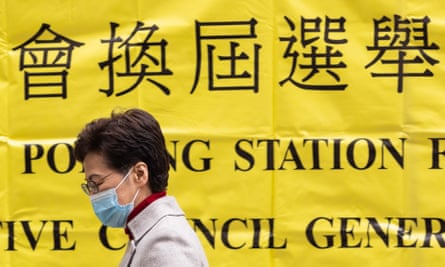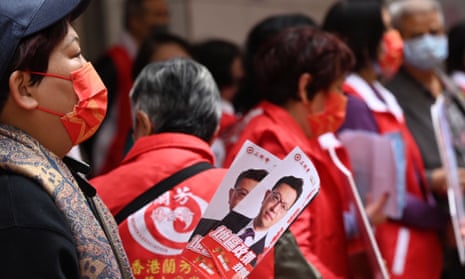Hongkongers have snubbed a legislature poll taking place under new “patriots only” rules imposed by China, with the lowest turnout since residents started electing lawmakers three decades ago, according to official figures released on Monday.
Only 30%, or 1,350,680 of the 4,472,863 registered voters, cast their ballots for city lawmakers in Sunday’s election, Hong Kong’s top election official, Barnabas Fung, told reporters.
The latest results showed almost all of the seats being taken by pro-Beijing and pro-establishment candidates. Some of those candidates cheered on stage at the central vote-counting centre and chanted “guaranteed win”. Results were still pending in some seats.
The polls, in which 153 candidates competed for 90 seats, were the first to be held since Beijing overhauled the city’s electoral processes earlier this year, reducing the ratio of directly elected seats and introducing a two-tiered candidate-vetting process by national security police and officials to ensure only “patriots” could administer the city.
The previous record low for turnout in a legislative election held after the city’s return from British to Chinese rule was 43.6% in 2000.
Low turnout came despite the city’s officials repeatedly urging residents to vote. The city’s largest opposition party, the Democratic party, fielded no candidates.
“The situation is critical,” Starry Lee, the head of the largest pro-Beijing party, DAB, said in a recorded loop played on a loudspeaker in the working-class Wong Tai Sin district. “I urge everyone to vote.”
The city’s second top official, John Lee, warned that candidates who had been banned from running for failing the “patriots” criteria would try to thwart the elections.
“People who have been excluded under the principles of patriots administering Hong Kong will be trying their best to make today’s election not be a success. We have to make sure that they will not succeed,” Lee told reporters after casting his vote. He added that the candidates were “broadly representative” of Hong Kong’s society.
But Kenneth Chan, the director of the Comparative Governance and Public Policy Research Centre at Hong Kong Baptist University, said the low turnout was a message pro-democracy voters were sending to authorities.
“Of course, the government won’t admit this is a referendum of sorts on their performance, but voters also know this election isn’t really about who gets the seats,” Chan said. “The low turnout rate indicates to what extent people here are pleased with the state of affairs [in Hong Kong].”
Hong Kong’s chief executive, Carrie Lam, told reporters after casting her vote that neither Beijing nor the local government had set targets for the voter turnout rate. Instead, Lam said her target was for the elections to be as efficient as possible.
More than 10,000 officers were deployed across the city to “ensure a smooth process”, according to police chief Raymond Siu.

Residents were given free public transport rides on election day as part of the government’s push to encourage them to vote. Polling stations were also set up at checkpoints at the city’s borders with mainland China to allow those living on the mainland to cast a vote.
Opinions over the polls were divided in the semi-autonomous Chinese territory. Yu Wai-kwan said he saw the election as a chance to vote for a better future. “I am voting to choose a new bunch of people to make Hong Kong a better place,” Yu said. “I am a patriot, and I just hope for peace and quiet, and to have a good livelihood.”
Other residents said they would not be voting, expressing anger at the changes that some said had turned the poll into a “selection” and the legislature into a “puppet”. “Refusing to vote is apparently the only way for us to express our grievances,” said Peter, 21, a university student.
Unlike previous polls, pro-democracy candidates were largely absent, having declined to run, gone into exile or been jailed. Some overseas activists and foreign governments, including the US, say the electoral changes have reduced democratic representation in the city.
Only four of the 35 candidates running for the 20 directly elected seats mentioned “democracy” or “universal suffrage” in their campaigns. The new system has reduced the proportion of legislators voters can directly elect from 53% to 22%.
The election rollout was also beset by early hiccups, with an online service to inform the public of expected queueing times at polling stations offline an hour after the polls opened because of “excessive usage”, according to a spokesperson for the Registration and Electoral Office.









